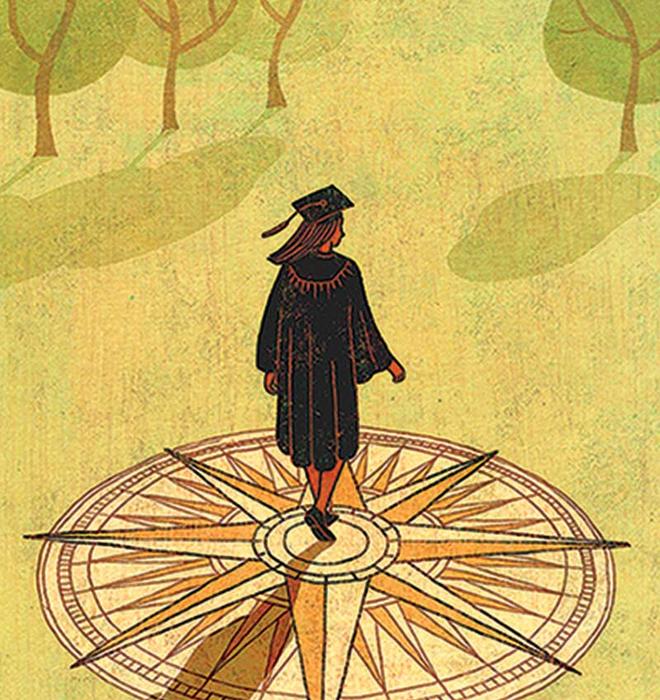
Gabriela’s Story
Gabriela* grew up in Newark, New Jersey, and graduated from Princeton a little over a year before our interview took place. She is half-Brazilian — her mom was an immigrant — but grew up with her White father after her parents’ divorce. They struggled financially. Her father was unemployed for long stretches of time. Sometimes they had no heat in the winter. Gabriela attended a Catholic school in Elizabeth, New Jersey, on a full scholarship. The school was safe, but it wasn’t like the kind of private schools that many of her classmates at Princeton had attended. It was majority non-White, and it didn’t regularly send students to highly selective colleges.
Gabriela had a rough first semester. She didn’t get adequate advising, took too many courses, and struggled academically. She told me that she internalized the “idea that [she] wasn’t good enough ... that [she] was an affirmative-action admit or that [she] wasn’t smart enough to be there ... an admissions mistake.” She felt that others saw her as a token — that she was there to “represent minorities” and so she had to work extra hard to prove that she was as good as everyone else. Despite these initial challenges, Gabriela flourished. She joined two very different groups — the women’s rugby team, which she described as more diverse in a variety of ways than the general population at Princeton, and a sorority, which provided a different kind of female bonding experience. These groups and a professor who “went out of his way to remind [her] that she deserved to be at Princeton” provided crucial support and guidance.Even as she became more and more integrated into a diverse set of new social networks, Gabriela still went back home often, especially when her grandmother fell ill. In her senior year, when her grandmother’s health deteriorated further, Gabriela lived at home at the beginning of the semester. She drove to school early in the morning to take classes and back home in the evening — an experience that probably very few of her classmates were having in their last year of college. Her relationship with her home community was complicated. She told me: “I get a lot of judgment from the community ... just because they couldn’t understand my ambitions, people who didn’t understand why I didn’t come home from college every weekend, didn’t understand why I wanted to study, didn’t understand why I would study something stupid like politics.”
Yet Gabriela wasn’t entirely comfortable with the social life at Princeton either. The undergraduate experience at Princeton has long been dominated by eating clubs, controversial co-ed social and dining clubs that have been part of the university’s history since the nineteenth century. Gabriela hated the eating club system. And the university itself has viewed the clubs critically, suggesting in a 2010 report that “the clubs ... continue to be a polarizing force, for reasons that seem to derive in part from a social stratification that persists despite a number of efforts to ameliorate it, with students from lower-income families and minority groups participating less fully in the clubs than other students.” But despite Gabriela’s well-founded dislike of the eating clubs, she still joined one, feeling that it was important to have a club on her résumé when she went out on the job market. The alternative, being an “independent” (the name given to those who are not members of eating clubs at Princeton), meant in her view: “You’re poor. Everyone knows it. Nobody wants to talk about it ... but having that club on my résumé is going to have political payoffs later on.”
Gabriela became adept at navigating both worlds during college. But when I asked her about her community now, she found it hard to identify one. She no longer went back home; her grandmother had passed away, and her father had moved abroad. She told me she was comfortable among the other college graduates in her internship program but felt particularly close to her roommate, the only other minority. They were able to talk about their experiences in a way that she could not with some of the other people in the program. But she wasn’t entirely sure how she felt about the ease with which she now fit in with her group of college-educated co-workers. She often discussed this with her roommate, wondering whether they were more at ease because of “assimilation and becoming comfortable with being a minority or getting tired of pushing back and demanding to be treated better ... [or] how much of it is actual improvements.” As we will see, the questions that Gabriela and her roommate are contending with here — How am I changing? And, crucially, why? — are at the heart of the codeswitching experience for strivers.
*pseudonym
READ MORE:
The Price of Upward MobilityWhat do students leave behind on the path to success?







1 Response
Norman Ravitch *62
6 Years AgoBoring Cultural Crises
I for one am sick of reading about people's identity problems, people's concern with diversity nonsense, and all the rest of the boring cultural crises that are manufactured by the media. At least the Alumni Weekly could refrain from all this idiocy.